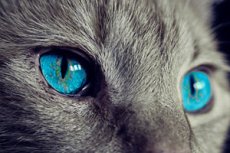Cats were excellent nutritionists
Last reviewed: 19.10.2021

All iLive content is medically reviewed or fact checked to ensure as much factual accuracy as possible.
We have strict sourcing guidelines and only link to reputable media sites, academic research institutions and, whenever possible, medically peer reviewed studies. Note that the numbers in parentheses ([1], [2], etc.) are clickable links to these studies.
If you feel that any of our content is inaccurate, out-of-date, or otherwise questionable, please select it and press Ctrl + Enter.

A new study of scientists is likely to interest owners of cats and cats, because the food of their pet is an important aspect for the health, strength and energy of the animal, so caring owners will be interested to know that their pets can make their own diet and perfectly navigate the nutritional value products.
A group of scientists from the Waltham Research Center and the University of Massi's Institute of Natural Sciences found that a domestic cat can combine food on its own, which gives her the opportunity to make the necessary healthy diet for her.
Provided that the cat is provided with a variety of products, and not only with dry feeds, it can independently determine the amount of proteins, fats and carbohydrates that it needs.
The results of the work of scientists are published in the scientific journal "Comparative Physiology B".
Pets have the ability to regulate the consumption of macronutrients, regulating and controlling their choice, despite the varying degrees of nutrient content and texture of food.
In a series of experiments consisting of three parts, the cats received a different texture of food, both dry and wet, and they were given different portions of food.
During the study, cats received the same amount of time only dry and wet food, and in the intervals they were given portions where both wet and dry food were present together. The results were as follows: regardless of diet, cats in any case consumed the same amount of proteins, fats and carbohydrates, without departing from its norm.
"After a series of experiments with nutrition, we found out an interesting fact - all animals chose products in such a way as to meet the daily needs of the body and get 52% of proteins, 36% of fats and 12% of carbohydrates," experts commented.
The results of the current study confirmed the findings of the previous one published in the journal "Journal of Experimental Biology" in 2011 and showed that domestic cats choose food similarly wild. This means that even the "domesticity" of cats has not affected their ability to regulate the supply of nutrient macronutrients, which exactly corresponds to the natural "diet" of their wild ancestors.
The author of this study, Dr. Adrian Hewson-Hughes, notes: "Our experiment is important for the owners of cats. He demonstrated their excellent ability to select and combine moist and dry foods in order to obtain the ideal balance of proteins, fats and carbohydrates for their body. With regard to cat food, at present wet food contains more fats and proteins, but in dry carbohydrates predominate. Providing cats with a combination of dry and wet forage gives pets the opportunity not only independently and, as we can see, accurately enough, maintain the level of nutrients in the body, but in this way and take great care of their own health, which meets their natural predatory nature. "
